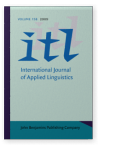Vol. 158 (2009) ► pp.31–56
An exploratory study of the use of a Thai politeness marker by Thai-English bilingual adolescents
This study examines the use of a Thai politeness marker, khráb (ครับ), by two Thai-English bilingual brothers, aged 11 and 15, during their 3-year stay in the U.S. By examining spontaneous speech data collected over eleven months (from Month 15 to Month 25 from time of arrival in the U.S.) in the boys’ home in the U.S., we show that the two brothers used progressively less khráb (ครับ) in speaking to their mother as time passed. The boys’ declining use of the politeness marker is explained in part by their greater use of other casual Thai particles as substitutes and, in the case of the younger brother, the English filler, ‘uh-huh.’ When the boys used khráb (ครับ), it was often for reasons other than for expressing politeness, such as to soften short responses and mitigate potential conflict. This paper argues that the boys’ use of this politeness marker reflects their ability to adapt to a new setting where there is less pressure to supply socially appropriate linguistic forms in Thai. By focusing on the continuing development of the first language of L2 learners of English, this paper presents a critical look at the changing linguistic needs of sojourners.
